NRSG 370: Analyzing Safety and Legal Roles in Peri-Operative Care
VerifiedAdded on 2022/12/14
|7
|1562
|336
Essay
AI Summary
This essay critically analyzes the safety and legal responsibilities of registered nurses in peri-operative clinical areas, focusing on physical and emotional safety while considering patients' legal rights. It highlights the importance of safe and quality care before, during, and after operations, emphasizing adherence to nursing standards and legal guidelines. The essay discusses a real-life incident involving a medication error, underscoring the need for comprehensive patient assessment and therapeutic communication. It concludes that maintaining patient safety and upholding legal responsibilities are essential for enhancing patient outcomes in peri-operative nursing. The essay is based on the course NRSG 370.
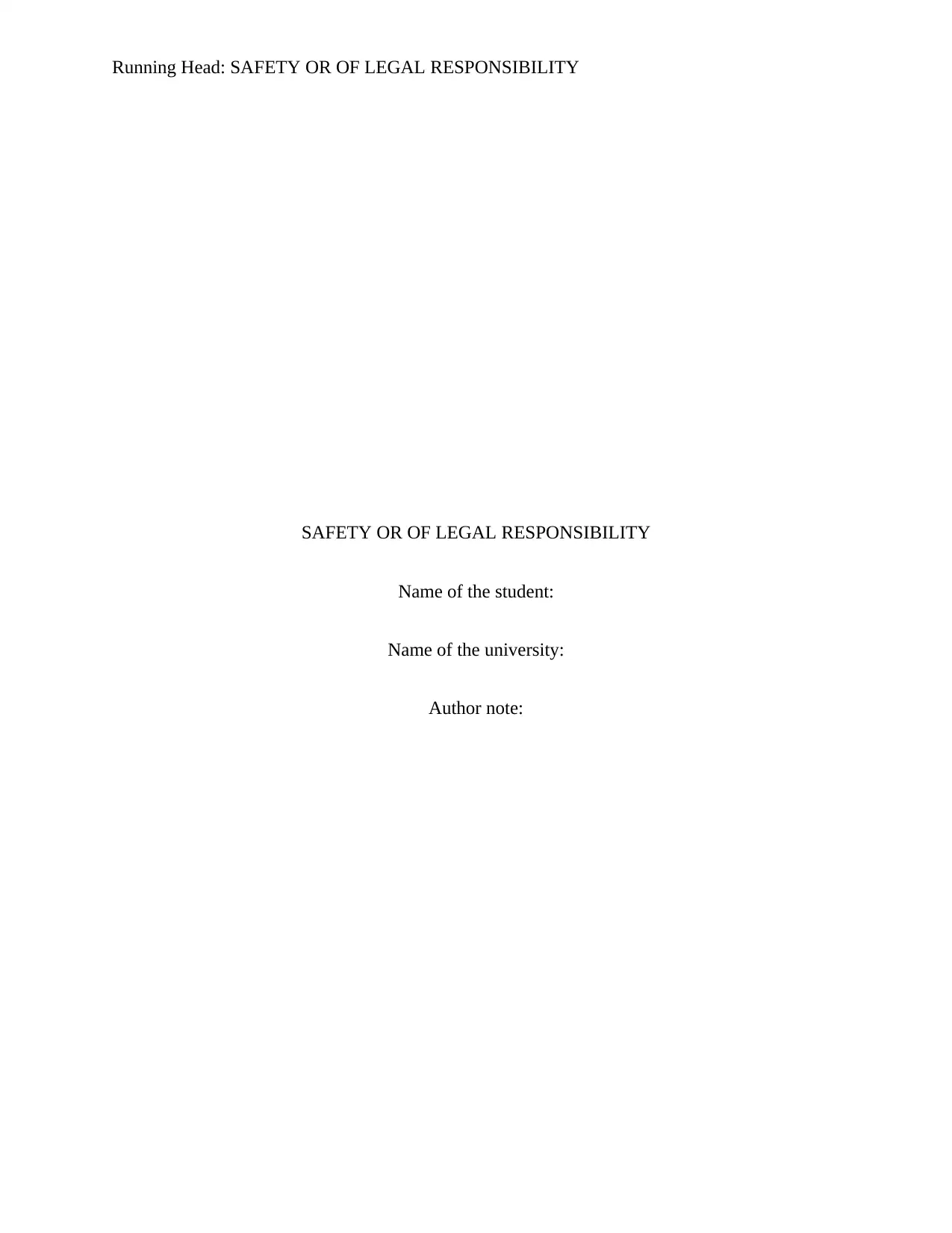
Running Head: SAFETY OR OF LEGAL RESPONSIBILITY
SAFETY OR OF LEGAL RESPONSIBILITY
Name of the student:
Name of the university:
Author note:
SAFETY OR OF LEGAL RESPONSIBILITY
Name of the student:
Name of the university:
Author note:
Paraphrase This Document
Need a fresh take? Get an instant paraphrase of this document with our AI Paraphraser
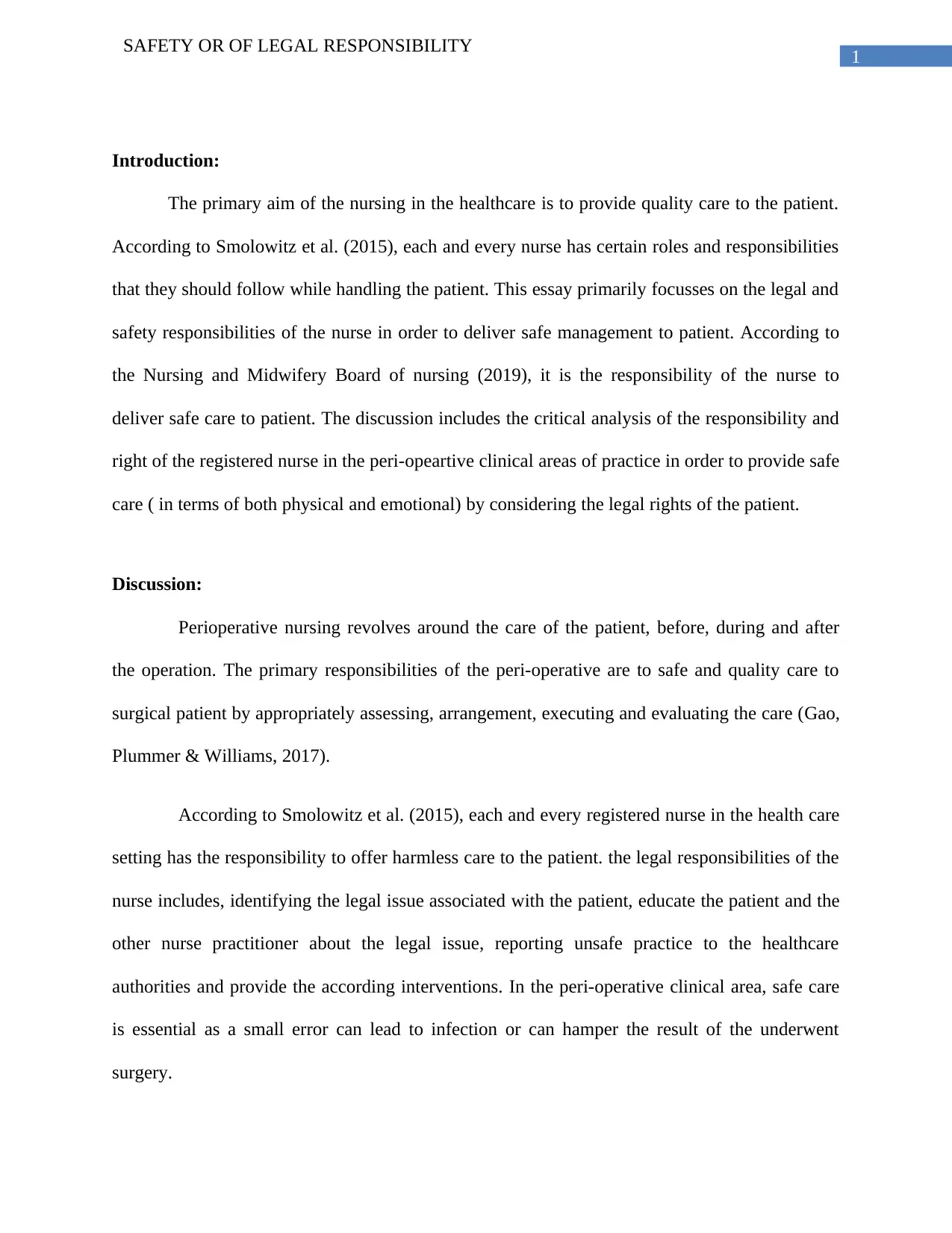
1
SAFETY OR OF LEGAL RESPONSIBILITY
Introduction:
The primary aim of the nursing in the healthcare is to provide quality care to the patient.
According to Smolowitz et al. (2015), each and every nurse has certain roles and responsibilities
that they should follow while handling the patient. This essay primarily focusses on the legal and
safety responsibilities of the nurse in order to deliver safe management to patient. According to
the Nursing and Midwifery Board of nursing (2019), it is the responsibility of the nurse to
deliver safe care to patient. The discussion includes the critical analysis of the responsibility and
right of the registered nurse in the peri-opeartive clinical areas of practice in order to provide safe
care ( in terms of both physical and emotional) by considering the legal rights of the patient.
Discussion:
Perioperative nursing revolves around the care of the patient, before, during and after
the operation. The primary responsibilities of the peri-operative are to safe and quality care to
surgical patient by appropriately assessing, arrangement, executing and evaluating the care (Gao,
Plummer & Williams, 2017).
According to Smolowitz et al. (2015), each and every registered nurse in the health care
setting has the responsibility to offer harmless care to the patient. the legal responsibilities of the
nurse includes, identifying the legal issue associated with the patient, educate the patient and the
other nurse practitioner about the legal issue, reporting unsafe practice to the healthcare
authorities and provide the according interventions. In the peri-operative clinical area, safe care
is essential as a small error can lead to infection or can hamper the result of the underwent
surgery.
SAFETY OR OF LEGAL RESPONSIBILITY
Introduction:
The primary aim of the nursing in the healthcare is to provide quality care to the patient.
According to Smolowitz et al. (2015), each and every nurse has certain roles and responsibilities
that they should follow while handling the patient. This essay primarily focusses on the legal and
safety responsibilities of the nurse in order to deliver safe management to patient. According to
the Nursing and Midwifery Board of nursing (2019), it is the responsibility of the nurse to
deliver safe care to patient. The discussion includes the critical analysis of the responsibility and
right of the registered nurse in the peri-opeartive clinical areas of practice in order to provide safe
care ( in terms of both physical and emotional) by considering the legal rights of the patient.
Discussion:
Perioperative nursing revolves around the care of the patient, before, during and after
the operation. The primary responsibilities of the peri-operative are to safe and quality care to
surgical patient by appropriately assessing, arrangement, executing and evaluating the care (Gao,
Plummer & Williams, 2017).
According to Smolowitz et al. (2015), each and every registered nurse in the health care
setting has the responsibility to offer harmless care to the patient. the legal responsibilities of the
nurse includes, identifying the legal issue associated with the patient, educate the patient and the
other nurse practitioner about the legal issue, reporting unsafe practice to the healthcare
authorities and provide the according interventions. In the peri-operative clinical area, safe care
is essential as a small error can lead to infection or can hamper the result of the underwent
surgery.
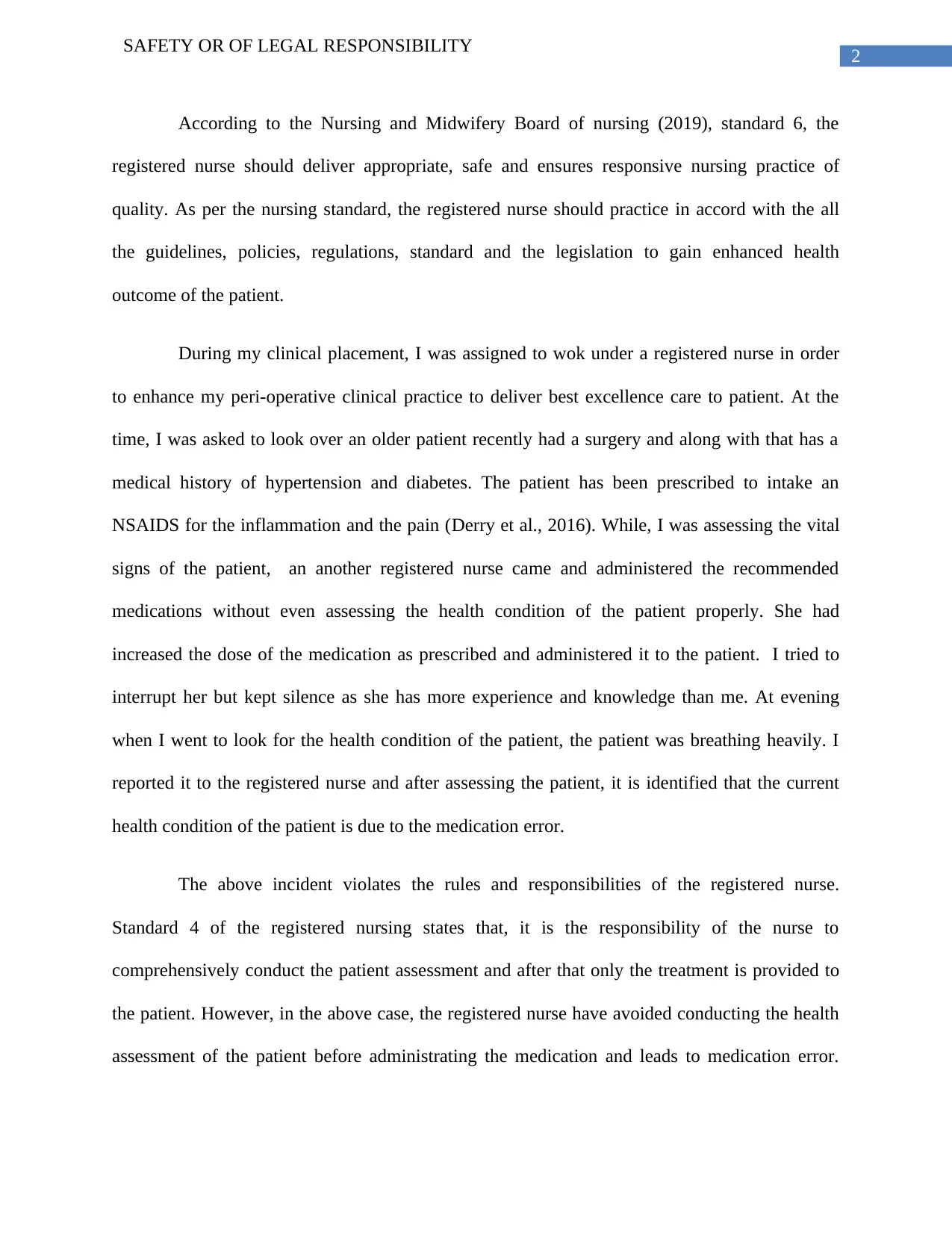
2
SAFETY OR OF LEGAL RESPONSIBILITY
According to the Nursing and Midwifery Board of nursing (2019), standard 6, the
registered nurse should deliver appropriate, safe and ensures responsive nursing practice of
quality. As per the nursing standard, the registered nurse should practice in accord with the all
the guidelines, policies, regulations, standard and the legislation to gain enhanced health
outcome of the patient.
During my clinical placement, I was assigned to wok under a registered nurse in order
to enhance my peri-operative clinical practice to deliver best excellence care to patient. At the
time, I was asked to look over an older patient recently had a surgery and along with that has a
medical history of hypertension and diabetes. The patient has been prescribed to intake an
NSAIDS for the inflammation and the pain (Derry et al., 2016). While, I was assessing the vital
signs of the patient, an another registered nurse came and administered the recommended
medications without even assessing the health condition of the patient properly. She had
increased the dose of the medication as prescribed and administered it to the patient. I tried to
interrupt her but kept silence as she has more experience and knowledge than me. At evening
when I went to look for the health condition of the patient, the patient was breathing heavily. I
reported it to the registered nurse and after assessing the patient, it is identified that the current
health condition of the patient is due to the medication error.
The above incident violates the rules and responsibilities of the registered nurse.
Standard 4 of the registered nursing states that, it is the responsibility of the nurse to
comprehensively conduct the patient assessment and after that only the treatment is provided to
the patient. However, in the above case, the registered nurse have avoided conducting the health
assessment of the patient before administrating the medication and leads to medication error.
SAFETY OR OF LEGAL RESPONSIBILITY
According to the Nursing and Midwifery Board of nursing (2019), standard 6, the
registered nurse should deliver appropriate, safe and ensures responsive nursing practice of
quality. As per the nursing standard, the registered nurse should practice in accord with the all
the guidelines, policies, regulations, standard and the legislation to gain enhanced health
outcome of the patient.
During my clinical placement, I was assigned to wok under a registered nurse in order
to enhance my peri-operative clinical practice to deliver best excellence care to patient. At the
time, I was asked to look over an older patient recently had a surgery and along with that has a
medical history of hypertension and diabetes. The patient has been prescribed to intake an
NSAIDS for the inflammation and the pain (Derry et al., 2016). While, I was assessing the vital
signs of the patient, an another registered nurse came and administered the recommended
medications without even assessing the health condition of the patient properly. She had
increased the dose of the medication as prescribed and administered it to the patient. I tried to
interrupt her but kept silence as she has more experience and knowledge than me. At evening
when I went to look for the health condition of the patient, the patient was breathing heavily. I
reported it to the registered nurse and after assessing the patient, it is identified that the current
health condition of the patient is due to the medication error.
The above incident violates the rules and responsibilities of the registered nurse.
Standard 4 of the registered nursing states that, it is the responsibility of the nurse to
comprehensively conduct the patient assessment and after that only the treatment is provided to
the patient. However, in the above case, the registered nurse have avoided conducting the health
assessment of the patient before administrating the medication and leads to medication error.
⊘ This is a preview!⊘
Do you want full access?
Subscribe today to unlock all pages.

Trusted by 1+ million students worldwide
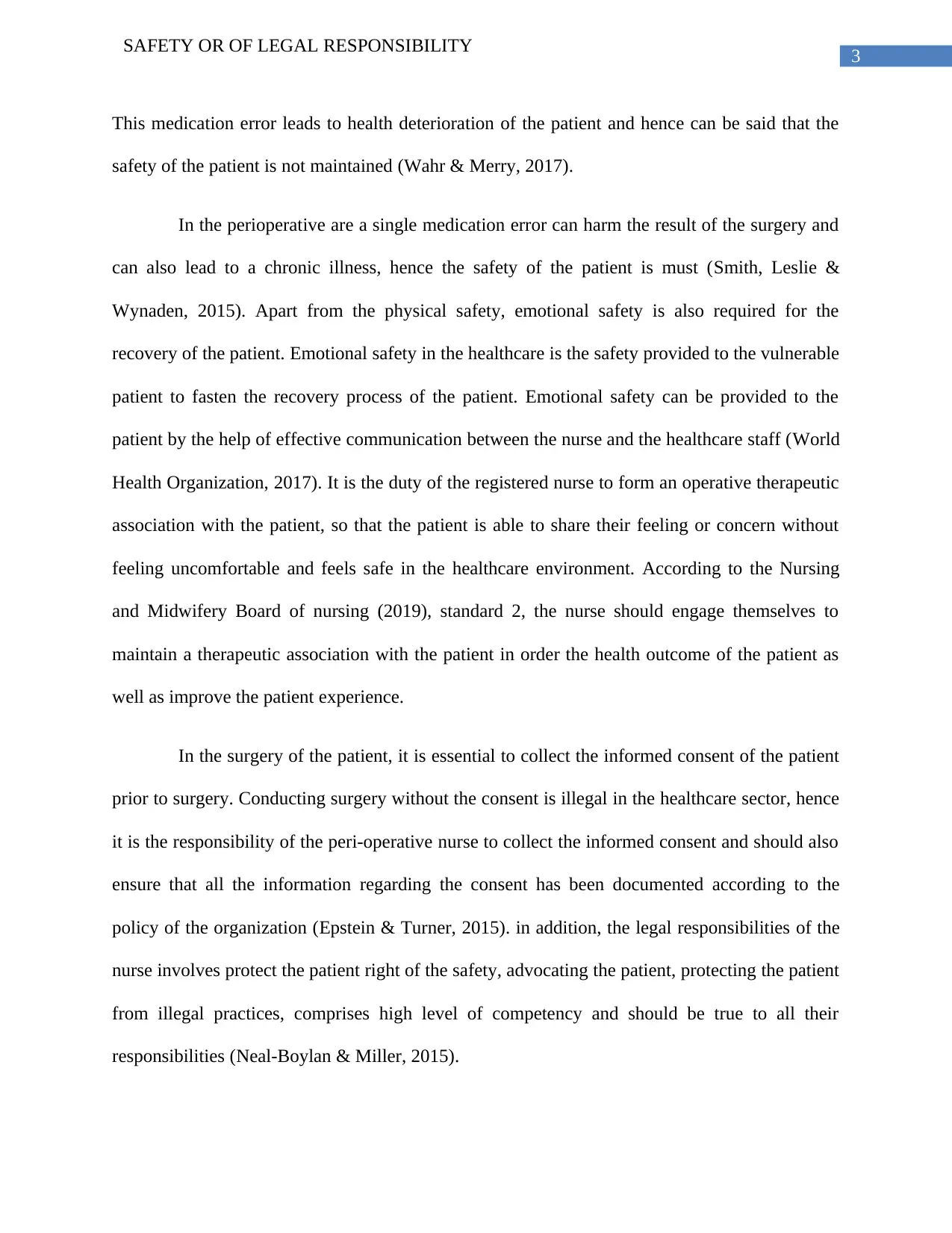
3
SAFETY OR OF LEGAL RESPONSIBILITY
This medication error leads to health deterioration of the patient and hence can be said that the
safety of the patient is not maintained (Wahr & Merry, 2017).
In the perioperative are a single medication error can harm the result of the surgery and
can also lead to a chronic illness, hence the safety of the patient is must (Smith, Leslie &
Wynaden, 2015). Apart from the physical safety, emotional safety is also required for the
recovery of the patient. Emotional safety in the healthcare is the safety provided to the vulnerable
patient to fasten the recovery process of the patient. Emotional safety can be provided to the
patient by the help of effective communication between the nurse and the healthcare staff (World
Health Organization, 2017). It is the duty of the registered nurse to form an operative therapeutic
association with the patient, so that the patient is able to share their feeling or concern without
feeling uncomfortable and feels safe in the healthcare environment. According to the Nursing
and Midwifery Board of nursing (2019), standard 2, the nurse should engage themselves to
maintain a therapeutic association with the patient in order the health outcome of the patient as
well as improve the patient experience.
In the surgery of the patient, it is essential to collect the informed consent of the patient
prior to surgery. Conducting surgery without the consent is illegal in the healthcare sector, hence
it is the responsibility of the peri-operative nurse to collect the informed consent and should also
ensure that all the information regarding the consent has been documented according to the
policy of the organization (Epstein & Turner, 2015). in addition, the legal responsibilities of the
nurse involves protect the patient right of the safety, advocating the patient, protecting the patient
from illegal practices, comprises high level of competency and should be true to all their
responsibilities (Neal‐Boylan & Miller, 2015).
SAFETY OR OF LEGAL RESPONSIBILITY
This medication error leads to health deterioration of the patient and hence can be said that the
safety of the patient is not maintained (Wahr & Merry, 2017).
In the perioperative are a single medication error can harm the result of the surgery and
can also lead to a chronic illness, hence the safety of the patient is must (Smith, Leslie &
Wynaden, 2015). Apart from the physical safety, emotional safety is also required for the
recovery of the patient. Emotional safety in the healthcare is the safety provided to the vulnerable
patient to fasten the recovery process of the patient. Emotional safety can be provided to the
patient by the help of effective communication between the nurse and the healthcare staff (World
Health Organization, 2017). It is the duty of the registered nurse to form an operative therapeutic
association with the patient, so that the patient is able to share their feeling or concern without
feeling uncomfortable and feels safe in the healthcare environment. According to the Nursing
and Midwifery Board of nursing (2019), standard 2, the nurse should engage themselves to
maintain a therapeutic association with the patient in order the health outcome of the patient as
well as improve the patient experience.
In the surgery of the patient, it is essential to collect the informed consent of the patient
prior to surgery. Conducting surgery without the consent is illegal in the healthcare sector, hence
it is the responsibility of the peri-operative nurse to collect the informed consent and should also
ensure that all the information regarding the consent has been documented according to the
policy of the organization (Epstein & Turner, 2015). in addition, the legal responsibilities of the
nurse involves protect the patient right of the safety, advocating the patient, protecting the patient
from illegal practices, comprises high level of competency and should be true to all their
responsibilities (Neal‐Boylan & Miller, 2015).
Paraphrase This Document
Need a fresh take? Get an instant paraphrase of this document with our AI Paraphraser
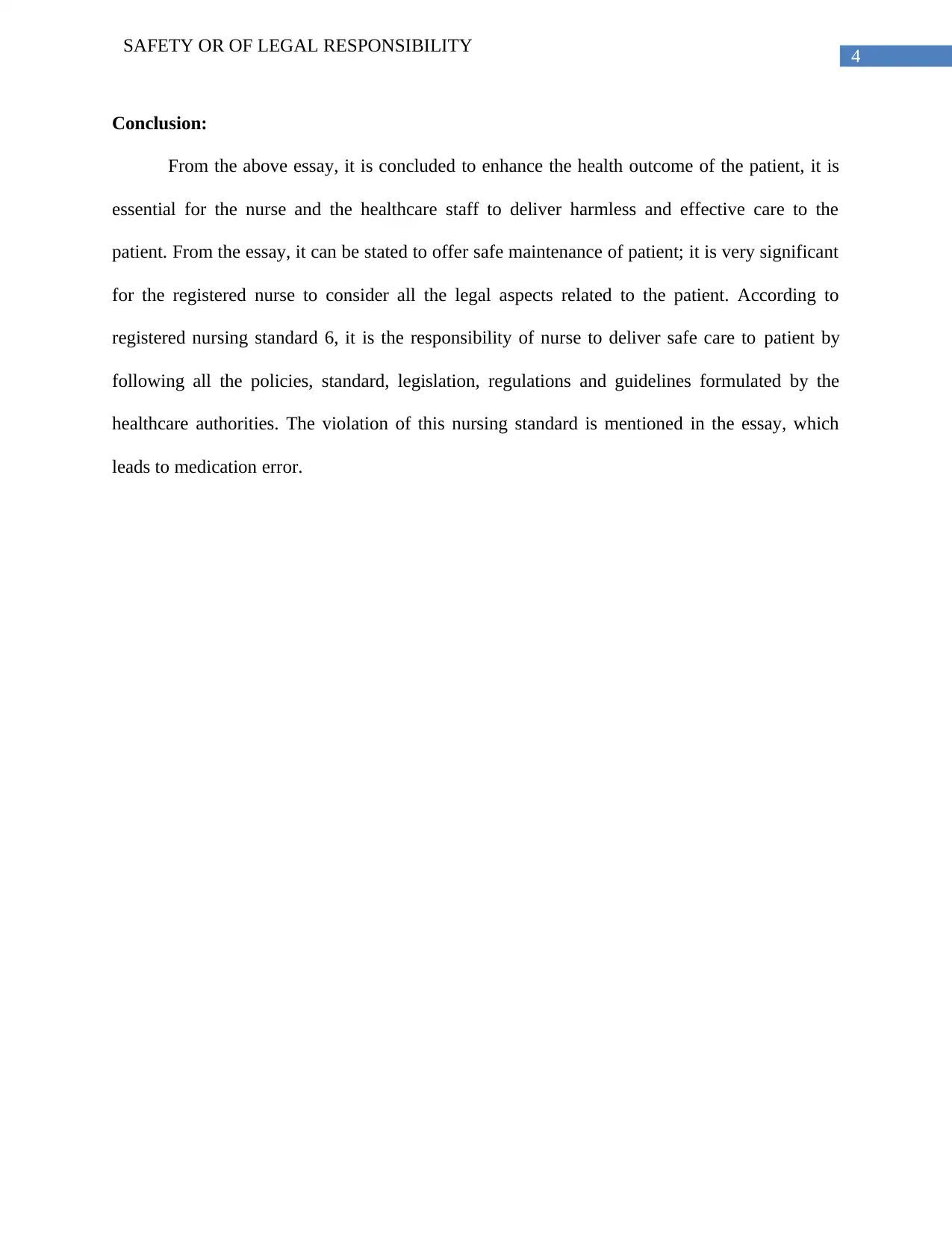
4
SAFETY OR OF LEGAL RESPONSIBILITY
Conclusion:
From the above essay, it is concluded to enhance the health outcome of the patient, it is
essential for the nurse and the healthcare staff to deliver harmless and effective care to the
patient. From the essay, it can be stated to offer safe maintenance of patient; it is very significant
for the registered nurse to consider all the legal aspects related to the patient. According to
registered nursing standard 6, it is the responsibility of nurse to deliver safe care to patient by
following all the policies, standard, legislation, regulations and guidelines formulated by the
healthcare authorities. The violation of this nursing standard is mentioned in the essay, which
leads to medication error.
SAFETY OR OF LEGAL RESPONSIBILITY
Conclusion:
From the above essay, it is concluded to enhance the health outcome of the patient, it is
essential for the nurse and the healthcare staff to deliver harmless and effective care to the
patient. From the essay, it can be stated to offer safe maintenance of patient; it is very significant
for the registered nurse to consider all the legal aspects related to the patient. According to
registered nursing standard 6, it is the responsibility of nurse to deliver safe care to patient by
following all the policies, standard, legislation, regulations and guidelines formulated by the
healthcare authorities. The violation of this nursing standard is mentioned in the essay, which
leads to medication error.
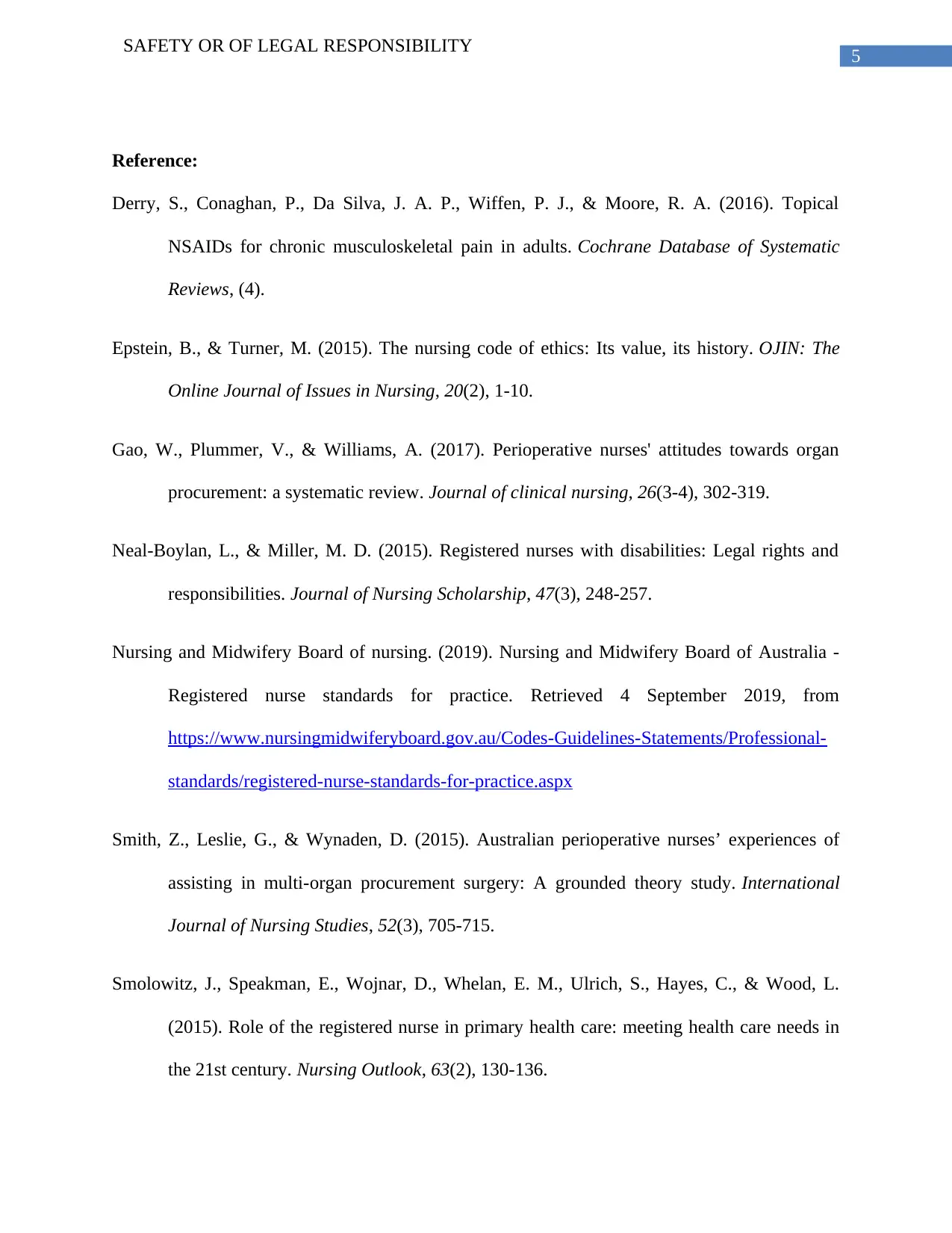
5
SAFETY OR OF LEGAL RESPONSIBILITY
Reference:
Derry, S., Conaghan, P., Da Silva, J. A. P., Wiffen, P. J., & Moore, R. A. (2016). Topical
NSAIDs for chronic musculoskeletal pain in adults. Cochrane Database of Systematic
Reviews, (4).
Epstein, B., & Turner, M. (2015). The nursing code of ethics: Its value, its history. OJIN: The
Online Journal of Issues in Nursing, 20(2), 1-10.
Gao, W., Plummer, V., & Williams, A. (2017). Perioperative nurses' attitudes towards organ
procurement: a systematic review. Journal of clinical nursing, 26(3-4), 302-319.
Neal‐Boylan, L., & Miller, M. D. (2015). Registered nurses with disabilities: Legal rights and
responsibilities. Journal of Nursing Scholarship, 47(3), 248-257.
Nursing and Midwifery Board of nursing. (2019). Nursing and Midwifery Board of Australia -
Registered nurse standards for practice. Retrieved 4 September 2019, from
https://www.nursingmidwiferyboard.gov.au/Codes-Guidelines-Statements/Professional-
standards/registered-nurse-standards-for-practice.aspx
Smith, Z., Leslie, G., & Wynaden, D. (2015). Australian perioperative nurses’ experiences of
assisting in multi-organ procurement surgery: A grounded theory study. International
Journal of Nursing Studies, 52(3), 705-715.
Smolowitz, J., Speakman, E., Wojnar, D., Whelan, E. M., Ulrich, S., Hayes, C., & Wood, L.
(2015). Role of the registered nurse in primary health care: meeting health care needs in
the 21st century. Nursing Outlook, 63(2), 130-136.
SAFETY OR OF LEGAL RESPONSIBILITY
Reference:
Derry, S., Conaghan, P., Da Silva, J. A. P., Wiffen, P. J., & Moore, R. A. (2016). Topical
NSAIDs for chronic musculoskeletal pain in adults. Cochrane Database of Systematic
Reviews, (4).
Epstein, B., & Turner, M. (2015). The nursing code of ethics: Its value, its history. OJIN: The
Online Journal of Issues in Nursing, 20(2), 1-10.
Gao, W., Plummer, V., & Williams, A. (2017). Perioperative nurses' attitudes towards organ
procurement: a systematic review. Journal of clinical nursing, 26(3-4), 302-319.
Neal‐Boylan, L., & Miller, M. D. (2015). Registered nurses with disabilities: Legal rights and
responsibilities. Journal of Nursing Scholarship, 47(3), 248-257.
Nursing and Midwifery Board of nursing. (2019). Nursing and Midwifery Board of Australia -
Registered nurse standards for practice. Retrieved 4 September 2019, from
https://www.nursingmidwiferyboard.gov.au/Codes-Guidelines-Statements/Professional-
standards/registered-nurse-standards-for-practice.aspx
Smith, Z., Leslie, G., & Wynaden, D. (2015). Australian perioperative nurses’ experiences of
assisting in multi-organ procurement surgery: A grounded theory study. International
Journal of Nursing Studies, 52(3), 705-715.
Smolowitz, J., Speakman, E., Wojnar, D., Whelan, E. M., Ulrich, S., Hayes, C., & Wood, L.
(2015). Role of the registered nurse in primary health care: meeting health care needs in
the 21st century. Nursing Outlook, 63(2), 130-136.
⊘ This is a preview!⊘
Do you want full access?
Subscribe today to unlock all pages.

Trusted by 1+ million students worldwide
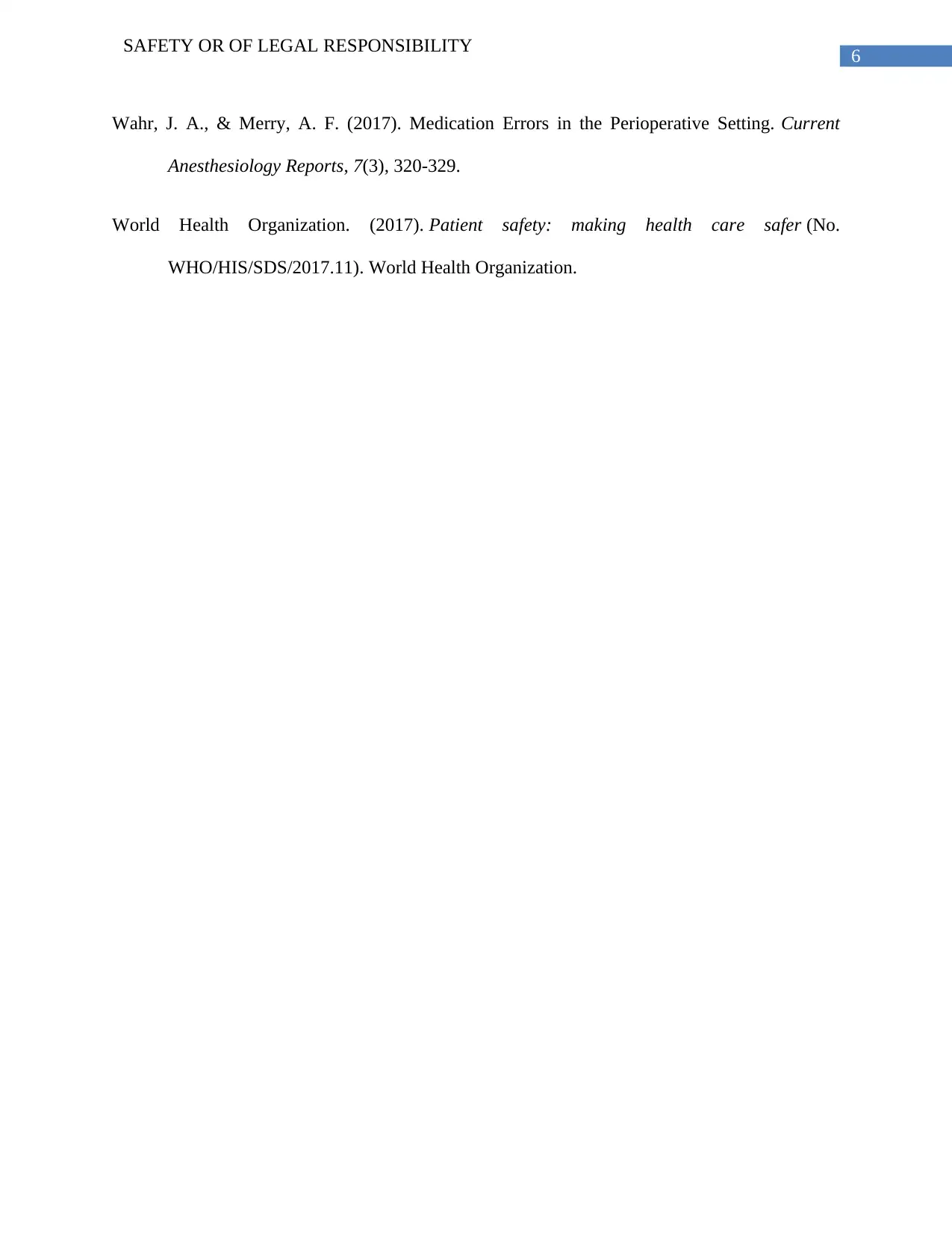
6
SAFETY OR OF LEGAL RESPONSIBILITY
Wahr, J. A., & Merry, A. F. (2017). Medication Errors in the Perioperative Setting. Current
Anesthesiology Reports, 7(3), 320-329.
World Health Organization. (2017). Patient safety: making health care safer (No.
WHO/HIS/SDS/2017.11). World Health Organization.
SAFETY OR OF LEGAL RESPONSIBILITY
Wahr, J. A., & Merry, A. F. (2017). Medication Errors in the Perioperative Setting. Current
Anesthesiology Reports, 7(3), 320-329.
World Health Organization. (2017). Patient safety: making health care safer (No.
WHO/HIS/SDS/2017.11). World Health Organization.
1 out of 7
Related Documents
Your All-in-One AI-Powered Toolkit for Academic Success.
+13062052269
info@desklib.com
Available 24*7 on WhatsApp / Email
![[object Object]](/_next/static/media/star-bottom.7253800d.svg)
Unlock your academic potential
Copyright © 2020–2026 A2Z Services. All Rights Reserved. Developed and managed by ZUCOL.





